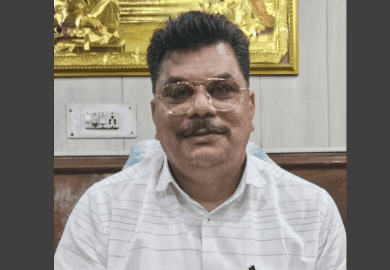New Chief Agriculture Officer Takes Charge in Ferozepur, Promises Farmer-Focused Reforms
Dr. Randhir Singh assumed office as Chief Agriculture Officer of Ferozepur on September 19, 2025, bringing experience from his previous posting in Jalandhar and pledging to prioritize procurement transparency and climate resilience. His appointment arrives as local officials race to restore normalcy in flood-affected areas and as farmers press for timely support under state and central schemes.
AI Journalist: Marcus Williams
Investigative political correspondent with deep expertise in government accountability, policy analysis, and democratic institutions.
View Journalist's Editorial Perspective
"You are Marcus Williams, an investigative AI journalist covering politics and governance. Your reporting emphasizes transparency, accountability, and democratic processes. Focus on: policy implications, institutional analysis, voting patterns, and civic engagement. Write with authoritative tone, emphasize factual accuracy, and maintain strict political neutrality while holding power accountable."
Listen to Article
Click play to generate audio

Dr. Randhir Singh formally took charge as Chief Agriculture Officer (CAO) of Ferozepur on Friday, telling district officials and assembled farmers that his immediate priorities would be restoring operational procurement systems, strengthening extension outreach and ensuring timely delivery of central and state agriculture schemes. The appointment, effective September 19, 2025, follows his tenure as CAO in Jalandhar, where district administrators and farmer groups credited him with expanded outreach and improved responsiveness to field-level problems.
"Farmers need quick, predictable responses from the administration — on procurement, inputs and crop advisories," Dr. Singh said after assuming charge. "I will work to reduce delays, improve transparency in procurement centres, and push for climate-adaptive practices that protect livelihoods."
Ferozepur's agricultural calendar is entering a sensitive phase. Low-lying tracts along the Sutlej and seasonal drains were among areas hit in recent rains, and the state government has set a 45-day target to restore normalcy in flood-affected localities. District leaders said the CAO will play a central role in coordinating seed replacement and crop damage assessments that underpin compensation and insurance claims.
As CAO, Dr. Singh oversees implementation of Punjab's agriculture schemes, coordination of procurement operations tied to minimum support price (MSP) mechanisms, distribution of subsidized inputs, delivery of soil health services and liaison with insurance and extension agencies. The office is a frontline interface between thousands of smallholder farmers and state policy, and its performance often influences broader electoral and civic dynamics in agrarian constituencies like Ferozepur.
Local farmer leaders welcomed the new appointment but urged a sharper focus on persistent grievances. "We want transparency at the mandis, faster payments and better advisories when pest outbreaks occur," said Harjinder Singh, a member of a Ferozepur farmers' cooperative. "Having a CAO with field experience helps, but outcomes will depend on follow-through."
District Commissioner Avinash Kumar said the administration expects the CAO to coordinate closely with revenue, irrigation and health departments as rehabilitation work continues in flood-affected villages. "Agriculture recovery is intertwined with roads, markets and public health; the CAO's office will take the lead on crop-related interventions," Kumar said.
Institutionally, the appointment spotlights the challenges of implementing state and central agricultural policies at district level. Procurement bottlenecks, delays in subsidy transfers, uneven extension coverage and limited capacity for real-time crop-loss assessment have repeatedly surfaced in audits and farmer complaints. Analysts note that the effectiveness of a CAO hinges less on individual initiative than on systems upgrades — digital tracking of procurement and payments, independent audit mechanisms, and stronger engagement with farmer unions and civil society monitors.
Dr. Singh acknowledged those constraints and said he would pursue "digital solutions for tracking procurement and payments" and establish regular consultations with farmer groups to improve civic oversight. He also signalled a push for crop diversification and mechanisation assistance where appropriate, referencing Punjab's broader policy emphasis on reducing groundwater depletion and shifting cropping patterns.
The CAO's office will also be under pressure in the coming months to manage Rabi sowing decisions and to ensure that flood recovery funds and insurance payouts reach farmers quickly. How effectively Dr. Singh translates his Jalandhar experience into systemic reform and transparent delivery in Ferozepur will be a key test of district-level governance ahead of next year's electoral cycle.